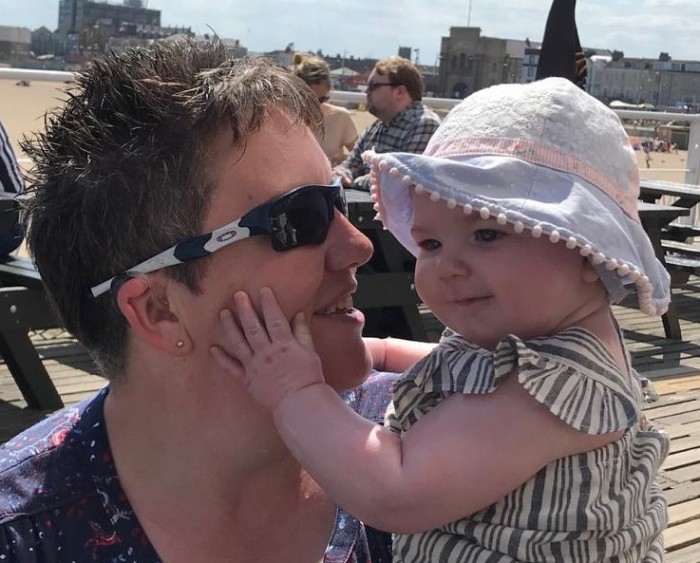“I tell my story to kids and talk about not giving up”
 These are the words that Mel Clarke, two-time Paralympic medallist, left us with last year after sharing her extraordinary story of sporting excellence.
These are the words that Mel Clarke, two-time Paralympic medallist, left us with last year after sharing her extraordinary story of sporting excellence.
As a result of contracting osteomyelitis after a fall in 1993, 11-year-old Mel found herself unable to walk, and believed that her sporting life was at an end. However, as a teenager, she discovered archery, and soon became one of the UK’s best-performing archers. But when Mel was struck down by Lyme disease at the 2003 World Archery Championships in New York City, the prognosis was grim: in fact, she wasn’t expected to survive.
Mel awoke from a two-week-long coma, paralysed from the waist down, and blind in her right eye. She left hospital and resumed her training. Mel returned from the 2008 Beijing Paralympics with a bronze medal, and the year after, she won Silver at the World Championships in the Czech Republic. At the 2012 London Paralympics, Mel won Silver – pipped at the post by her friend and fellow British competitor, Danielle Brown.
“Everything’s possible when you want to do it”
 Mel retired from competition archery in May this year – for the best possible reason.
Mel retired from competition archery in May this year – for the best possible reason.
In January 2019, Mel gave birth to Cali, who’s a dream come true for Mel and her husband Richard Hennahane (also a successful para-archer). In their minds, there was always the possibility that Mel might never be able to carry a child full term. But in January, Cali discredited that theory in the same style that her mother dismissed the general opinion that she’d have to give up competitive archery.
 “I can go back to archery later,” says Mel. “But I want to spend time with Cali. I won’t get this time back.”
“I can go back to archery later,” says Mel. “But I want to spend time with Cali. I won’t get this time back.”
I ask Mel about the challenges of motherhood in a wheelchair.
“Getting up at night is physically difficult … and I had to find a buggy that I could handle. But everything’s possible when you want to do it.”
“Wow! This is really making an impact”
Although Mel is not competing at the moment, she’s continuing her role of mentor for the Youth Sport Trust – a charitable organisation whose mission is to promote the general wellbeing of children through the provision of sporting opportunity.
The six main aims of the Youth Sport Trust are:
- To transform PE’s place in the curriculum, putting it at the centre of wellbeing and achievement in education.
- To support schools, clubs, and families to remove the causes of negative experiences for young people.
- To unlock sport’s potential at every stage of a child’s life, especially where they face inequality or disadvantage.
- To equip young people, through sport, with the skills, confidence, and opportunities to lead change in their communities.
- To champion the impact of physical activity, PE, and sport through research and insight.
- To deliver their charitable objectives through good governance, a skilled workforce, and sustainable income.

As a mentor, Mel’s work varies from small-group activities to whole-school assemblies. She talks to students of all ages, from the little ones of four years old, to young people of 18.
Many of the children Mel works with have physical disabilities, like the 14-year-old boy with quadriplegic cerebral palsy, whose only independent way of communicating was to turn his head left and right. Mel describes how this gutsy boy trained to be a sports leader. Using communication technology, he led sessions and delivered a presentation to his peers and their parents.
“The able-bodied kids were so impressed. And his mother was so proud! This was something she really didn’t think he’d be able to do. I remember thinking, ‘Wow. This is really making an impact.’ That child’s self-esteem just rocketed.”
“If I can help one person to think positively … it’s all worthwhile”
 Many of the children Mel works with have behaviour issues, or are simply disengaged. The characteristic trait of a disengaged student is a lack of interest. This block to learning can be tackled by helping a disengaged child to connect what they’re learning with real-life experiences, or to incorporate group work and hands-on learning.
Many of the children Mel works with have behaviour issues, or are simply disengaged. The characteristic trait of a disengaged student is a lack of interest. This block to learning can be tackled by helping a disengaged child to connect what they’re learning with real-life experiences, or to incorporate group work and hands-on learning.
Because of sport’s physical nature, a child with social anxiety can feel exposed and threatened in a PE class. Self-consciousness is agony to a person with social anxiety, and fear is a barrier to participation. With patience and empathy, Mel coached a boy with very low esteem to be a sports leader.
“At first, he’d hardly speak at all – to anyone. But during our sessions, his confidence grew, and at the end of his training, this lad delivered a speech to his teachers and class-mates. His mum said, ‘He’s a different person.’”
Of course, not every child will benefit from intervention of this kind. I ask Mel if this is disheartening.
“If I can help one person to think positively about what is possible, and encourage that person to work towards achieving their goal, then I’m happy. It’s all worthwhile.”
“I’m retiring with two titles, which is nice!”
Even Mel doesn’t know whether or not she’ll be returning to competition archery. But if this really is retirement, Mel has hung up her bow alongside the titles of British National Para Champion and British Wheelchair Sport Champion. With her usual cheerful optimism, Mel says, “I’m retiring with two titles, which is nice!”

